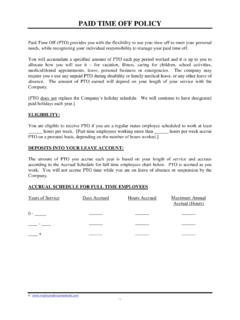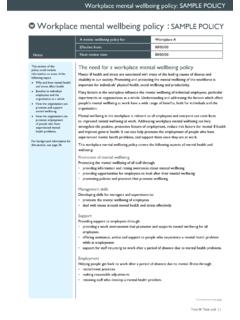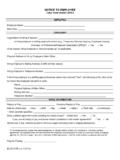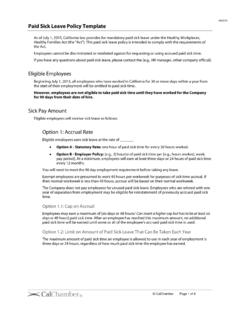Transcription of SAMPLE DRUG AND ALCOHOL TESTING POLICY (Emphasis …
1 SAMPLE drug AND ALCOHOL TESTING POLICY (Emphasis on CDL Positions) (Entity Name) is committed to a drug and ALCOHOL free workplace. In order to ensure the safety of its employees and the general public, as well as to comply with federal law, (entity name) has adopted the following POLICY . We take pride in employees who perform critical duties in a truly effective manner with safety foremost in their minds. This POLICY strengthens our commitment to a safe and healthy workplace. All covered employees shall receive a copy of this POLICY as well as educational materials on ALCOHOL and substance abuse. (Insert title) is designated as the drug / ALCOHOL TESTING Program Administrator. The Program Administrator is responsible for answering questions from employees or the general public. The Program Administrator will maintain the confidentiality of all information relating to drug and ALCOHOL TESTING . The Program Administrator may provide information necessary to enable the appropriate supervisor to take the appropriate action to ensure compliance with this POLICY .
2 This POLICY applies equally to all regular full-time, part-time, seasonal, on-call, temporary employees, and those who are required to hold a Commercial Driver s License (CDL) for their position. All applicants for positions requiring a CDL are required to pass a drug test as a prerequisite of employment prior to final hiring. Any applicant who fails a drug test shall not be hired, although he/she may re-apply for employment in the future. All CDL employees subject to drug and ALCOHOL TESTING must be compliance with this POLICY at all times while working for (entity name). This includes all time spent operating commercial vehicles as well as time spent maintaining or repairing those vehicles. Independent contractors and their employees who must hold a CDL for the contracted activity are subject to the requirements of federal law and are responsible for compliance. (Entity name) will not provide or pay for tests, evaluation, or rehabilitation for independent contractors or their employees.
3 We shall make compliance with the law a condition of any contract that requires a CDL driver. When drug and ALCOHOL screening is required by this POLICY , a breath test and/or urine test will be given to detect the following: ALCOHOL Marijuana Cocaine Amphetamines Phencyclidine (PCP) Opiates Employees covered by this POLICY may use prescription drugs and over-the-counter medications provided that: The prescription drugs or their generic equivalent have been prescribed to the employee within the past 12 months by an authorized medical practitioner. The employee does not consume prescribed drugs more often than prescribed by the employee s physician. Any employee who has been informed that the medication could cause adverse side effects while working shall inform his/her supervisor prior to using these substances. (Entity name) at all times reserves the right to have a licensed physician determine whether use of a prescription drug or medication by an employee produces an adverse effect.
4 If such a finding is made, (entity name) may notify the employee s doctor (with the employee s permission) to determine if other medications are available that would not seriously affect the employee s ability to work safely. If an appropriate substitute medicine is not available, (entity name) may limit or suspend the employee s work activities to non-safety sensitive duties. All employees subject to this POLICY shall be tested for ALCOHOL and/or controlled substances in the following circumstances: Pre-employment drug tests will be conducted when an offer is made to hire an employee for a CDL position. The offer of employment is contingent on the applicant passing these tests. This includes existing employees who are applying for CDL positions. Random drug and ALCOHOL tests will be conducted on a random, unannounced basis. The number of annual drug tests shall equal 50% of the number of CDL required positions while the number of annual ALCOHOL tests shall equal 25% of the CDL required positions.
5 (Entity name) has entered into an agreement with a third party administrator (TPA) to randomly select CDL employees for TESTING and then notify the Program Administrator of the person or persons chosen. Post-accident As soon as is practicable after an accident, the employee shall be tested for ALCOHOL and drugs if: (a) the accident involved the loss of human life; or (b) the employee received a citation for a moving traffic violation arising from the accident. Reasonable Suspicion All employees who exhibit to a trained supervisor signs and symptoms of ALCOHOL and/or drug abuse while on the job, prior to reporting to work, or just after work will be required to submit to an ALCOHOL and/or drug test. The supervisor shall document the specific facts, symptoms or observations. NOTE: An employee will not be allowed to drive him/herself to the TESTING facility for a reasonable suspicion test.
6 Instead, the supervisor or another employee will provide transportation to the TESTING facility. Return-to-duty Any employee who previously tested positive for a controlled substance or ALCOHOL will be required to submit to a drug and ALCOHOL test. To return to duty, the employee must test negative and be released by a substance abuse professional. Follow-up An employee who previously tested positive and has returned to duty must submit to a combination of at least six (6) ALCOHOL and drug tests during the first year after returning to work. Follow-up tests will be unannounced and may continue for up to sixty (60) months after returning to work, not to exceed twelve (12) a year. drug TESTING drug TESTING is accomplished by analyzing the employee s urine specimen (urinalysis). Specimens will be collected at an off-site facility selected by (entity name). Once the employee provides a urine specimen, it is sealed and labeled by a certified/authorized agent of the TESTING facility.
7 A chain of custody document is completed in the presence of the employee, and the specimen is shipped to a laboratory that is certified in accordance with Department of Health and Human Services (DHHS) guidelines or equivalent guidelines. All urinalysis procedures are required to include split-specimen techniques. Each urine SAMPLE is sub-divided into two containers and labeled as primary and split specimens. Both specimens are forwarded to the laboratory. Only the primary specimen is used in the urinalysis. In the event of a confirmed position test result, the split specimen may be used for a second confirmation test if requested by the employee. During TESTING an initial screening test is performed. If the test is positive for one or more drugs, a confirmation test will be performed for each individual drug using gas chromatography/mas spectrometry (GC/MS) analysis. This test ensures that over-the-counter medications are not reported as positive results.
8 If the analysis of the primary specimen results in a confirmed positive test, the employee may, within 72 hours, request that the split specimen also be tested at a certified laboratory of his choice. The second test is at the employee s expense unless the test result is negative, in which case (entity name) will reimburse the employee. All test results are reviewed by a Medical Review Officer (MRO) prior to results being reported to (entity name). In the event of a positive test result, the MRO will first attempt to contact the employee and conduct an interview to determine if there are any alternative legitimate reasons for the positive results (such as over-the-counter or prescription medications). If the MRO determines there is a legitimate medical explanation for the presence of drugs, the result will be reported as negative. If the MRO is unable to contact the employee, the employer will be contacted and requested to advise the employee to contact the MRO.
9 Urine samples shall be provided in a private test room, stall, or similar enclosure so that employees and applicants may not be viewed while providing the SAMPLE . Employees and applicants may be required to disrobe and wear hospital gowns while they are providing test samples in order to ensure that there is no tampering. Street clothes, bags, briefcases, purses, and other containers may not be carried into the test area. The water in the commode, if any, shall be colored with dye to protect against dilution of test samples . An employee or applicant may waive the right to privacy and provide the urine SAMPLE in the presence of a witness (of the same gender) and not be required to disrobe and wear a hospital gown. ALCOHOL TESTING ALCOHOL TESTING will be conducted using an evidential breath TESTING (EBT) device. A certified Breath ALCOHOL Technician (BAT) trained in the use of EBT and ALCOHOL - TESTING procedures must perform the breath test.
10 Under certain circumstances, post-accident tests conducted by law enforcement or medical personnel will be acceptable. Two (2) breath tests are required to determine if an individual is over the ALCOHOL concentration limit permitted. Any result of less than concentrations is considered a negative result. Any result of or greater requires a confirmation test. A confirmed test of or greater is considered a positive result. CDL employees shall not: 1. Report to work and/or remain on duty with an ALCOHOL concentration of or greater; 2. Possess any ALCOHOL while on duty; 3. Use any ALCOHOL while on duty; 4. Use any ALCOHOL within four (4) hours before going on duty; 5. Use any ALCOHOL within eight (8) hours after an accident for which the CDL employee must be tested for ALCOHOL concentration; 6. Refuse to submit to the following ALCOHOL and/or controlled substance tests: Random Test, Reasonable Suspicion Test, Post-Accident Test, or Follow-up Test; Failure to comply with these rules is a violation of this POLICY and may result in disciplinary action and shall result in referral to a substance abuse professional.





